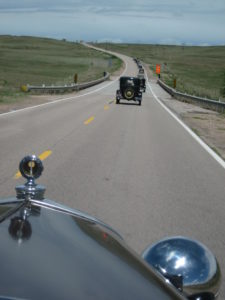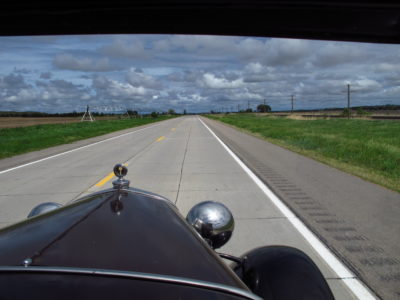Take it a little at a time.

If you’re daunted by writing your book, consider this old joke:
How do you eat an elephant?
One bite at a time.
Still, authorship means more than writing one word after another. You face multiple tasks. But broken into many small steps, any job can become feasible.
My father-in-law and I just completed a 1,200-mile road trip in a 1930 Model A Ford. An easy two-day jaunt for a modern car, the trip might seem impossible for an antique.
Except it was broken into many small portions. Tour leaders Vern and Linda divided the ambitious task into segments each driver could easily handle.
Planning
If you don’t know where you’re going, it’s hard to get there. Even if you’re an expert on your book’s topic, you must consider your audience’s knowledge, needs, and preferences. Before asking people in their car club to agree to drive 600 miles from Denver to Orange City, Iowa, Vern and Linda crafted a presentation that highlighted the attractions of the town and its tulip festival.
 Their planning included envisioning multiple stages to guide us to the desired destination. In a book or a novel, those are the chapters, sections, and scenes. For the Model A Ford club, they were one- to two-hour segments along highways that fit the cars’ speed and the drivers’ endurance. We knew each stage would take us to a place with gasoline, restrooms, and sometimes restaurants. At the end of each day, we were promised a nice motel. No matter if we encountered rough roads or rainy weather, each driver knew their effort would be rewarded.
Their planning included envisioning multiple stages to guide us to the desired destination. In a book or a novel, those are the chapters, sections, and scenes. For the Model A Ford club, they were one- to two-hour segments along highways that fit the cars’ speed and the drivers’ endurance. We knew each stage would take us to a place with gasoline, restrooms, and sometimes restaurants. At the end of each day, we were promised a nice motel. No matter if we encountered rough roads or rainy weather, each driver knew their effort would be rewarded.
Research
On each segment, we counted on Vern and Linda’s routing. If they said the Nebraska town had a Sinclair and a Cenex gas station, with a Subway restaurant in between, we trusted that’s what we’d find. Once, when the routing didn’t clearly mark a turn, we drove a few miles extra to reach the next highway.
Readers count on authors getting their facts straight, whether in fiction or nonfiction. Even a semi-autobiographical novel requires research. While you won’t use every fact you gather, each informs the words you put into print.
Pacing
If you could write at the breathtaking pace of 5,000 words a day, you’d still need weeks to complete a book. Few of us have the luxury of that much time—or the endurance to  maintain that pace. But if we cut back on television or other distractions, we could find two hours each weekday evening. Over a month, that’s nearly a week of full-time writing. Then there are gaps in our day when we could squeeze in a few minutes on our book: while waiting in line, during lunch, riding a commuter train to work …
maintain that pace. But if we cut back on television or other distractions, we could find two hours each weekday evening. Over a month, that’s nearly a week of full-time writing. Then there are gaps in our day when we could squeeze in a few minutes on our book: while waiting in line, during lunch, riding a commuter train to work …
When the Model A Fords took multi-lane roads, we kept to the right lane. Other vehicles passed going 65 or more, but that didn’t bother us. We chugged along at the 50 to 55 miles per hour Henry Ford intended. We kept to our natural pace, enjoyed the ride, and reached our destination.
Why not try that for your book.


